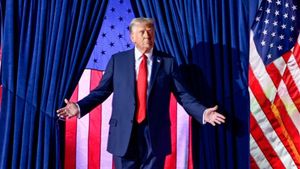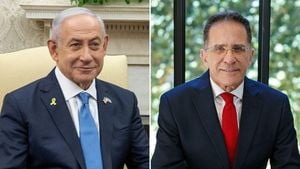With the prospect of Donald Trump returning to the White House, discussions about his potential second term have turned sharply toward fears of authoritarianism and extreme immigration policies. During his initial presidency, Trump exhibited alarming tendencies to circumvent constitutional boundaries, raising concerns about what another term might entail. Legal experts and political analysts alike are increasingly apprehensive as Trump outlines plans to empower himself, potentially dismantling democratic norms.
One of the most disconcerting aspects of Trump’s agenda is his seemingly open intention to use federal troops against domestic protesters and to enact widespread deportations. At recent campaign rallies, he has hinted at deploying militarized forces if necessary to quell dissent or enforce stricter immigration policies. His rhetoric indicates not only readiness but eagerness to flex military might against American citizens, raising questions about the legality and ethics of military involvement on domestic soil.
According to political insiders, Trump and his allies have been preparing operational plans for utilizing the U.S. military against civil demonstrators right from day one of his potential new administration. Reports allege he aims to deploy the military on the southern border, reflecting his hardline immigration stance, which seeks to expel millions of undocumented immigrants. The discussions also encompass using national forces to enforce order within cities Trump characterizes as high-crime areas.
Such measures would represent violations of the Posse Comitatus Act, which restricts military involvement in domestic law enforcement. Legal experts warn of the consequences of Trump's approach, particularly following recent Supreme Court decisions granting presidents heightened immunity for their official actions. The more unchecked authority he obtains, the closer to the reality of authoritarian governance the U.S. drifts.
Historically, Trump's inclination to deploy the military was evident when he took steps to invoke the Insurrection Act during the protests following the murder of George Floyd. He expressed frustratingly aggressive fantasies about shooting protestors, which were met with significant resistance from senior military officials. This precedent not only depicts his willingness to step over legal bounds but also poses serious risks for coercive governance.
Simultaneously, Trump's reconfiguration of his agenda focuses on immigration, seen as unjustly punitive by many. His appointments for key positions point to this reality. His selection of influential figures like Stephen Miller, Tom Homan, and South Dakota Governor Kristi Noem signal aggressive intentions for immigration. Miller, who previously shaped many of Trump’s harshest immigration policies, aims to engage directly with the president to expedite the most draconian plans already laid out, involving mass deportation camps.
These deportation strategies could potentially cost taxpayers upwards of $800 billion for the effort to remove millions against the baseline backdrop of provocative proposals targeting specific demographics, including pro-Palestinian protestors at universities across the country. The rhetoric around immigrants continues to be framed negatively, casting undocumented individuals as criminals needing eradication.
The upcoming presidential term is anticipated as one dominated by Trump loyalists, especially as the former president clears out bureaucratic hurdles crafted by prior administrations. Concerns loom over Project 2025, which would transform the federal workforce by appointing loyalists to key roles previously filled by seasoned, impartial officials. This potential deep-seated loyalty could cut through the fabric of expertise within government agencies.
Observers note stark differences between Trump's first and possible second terms, as he cultivates an administration steeped in loyalty to his personal agenda rather than public service. The emergence of this climate sets the stage for potential abuses of power and deeply punitive immigration practices without the regulatory checks historically present.
Political scientists articulate the potential shift from pragmatic governance to unrestrained autocracy. The second Trump administration, equipped with allies to insulate him from dissent, could severely threaten democratic values through indifference to institutional constraints.
On the foreign policy front, Trump’s limited checks may enable him to operate with significantly greater freedom. Critics fear he would have little hesitation to make concessions to authoritarian regimes, particularly concerning U.S. relations with Russia and Israel. His stated intent to resolve the Ukraine conflict could lead to ominous repercussions, including reasserting favor toward Russian interests—a matter of alarm amid global tensions.
The specter of Trumpism characterized by aggressive anti-immigration sentiments and militaristic responses to domestic unrest casts long shadows over the political horizon. For those who advocated hope through institutional checks, the current discourse raises pressing questions about the stability of American democracy under potential future leadership. The notion of military presence against American citizens and the promise to use it could usher in unpredictable challenges for civil society.
Combining these elements—the direct threat to social order, militarization of domestic policy, and punitive immigration strategies—creates a clearer picture of potential future governance. Should Trump return to office, observers believe we might see the true transformation of the American political structure, inviting comparisons to historical authoritarian regimes where civil liberties were readily compromised.
A return to power could solidify policies stripping marginalized populations of their rights to speak and assemble freely. The fear of repercussions, as well as fears about broader civil rights eroding, threatens to entrench self-censorship and compliance among the citizenry, reducing public discourse and dissent to hushed whispers.
Simply put, as Trump positions himself for potential reinstatement, the stakes for American democracy and social fabric reach unprecedented levels. While the alarms are sounding louder than ever, the public’s arena for action is narrowing, pushing against the currents of autocratic ambition. What will the future hold for governance intertwined with military presence, draconian immigration policies, and diminished civil liberties?



